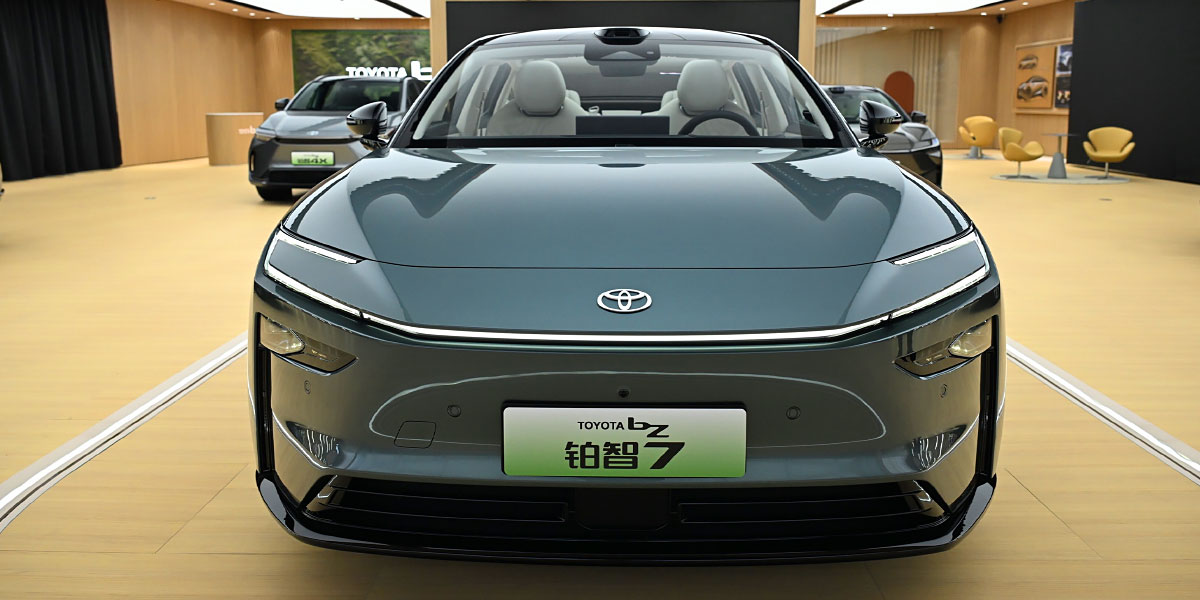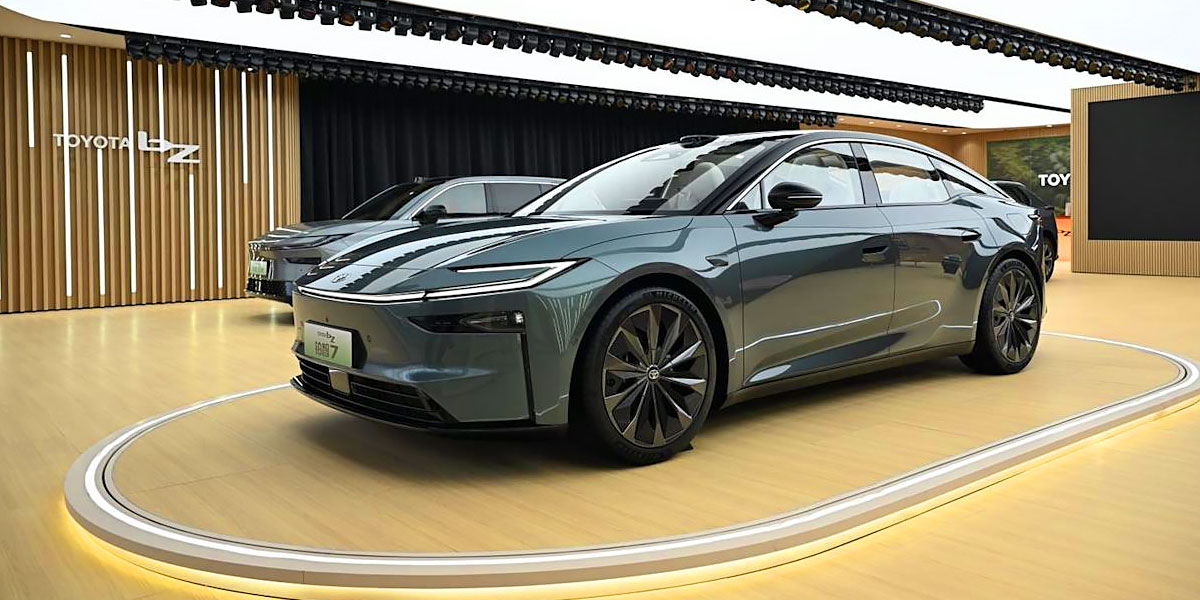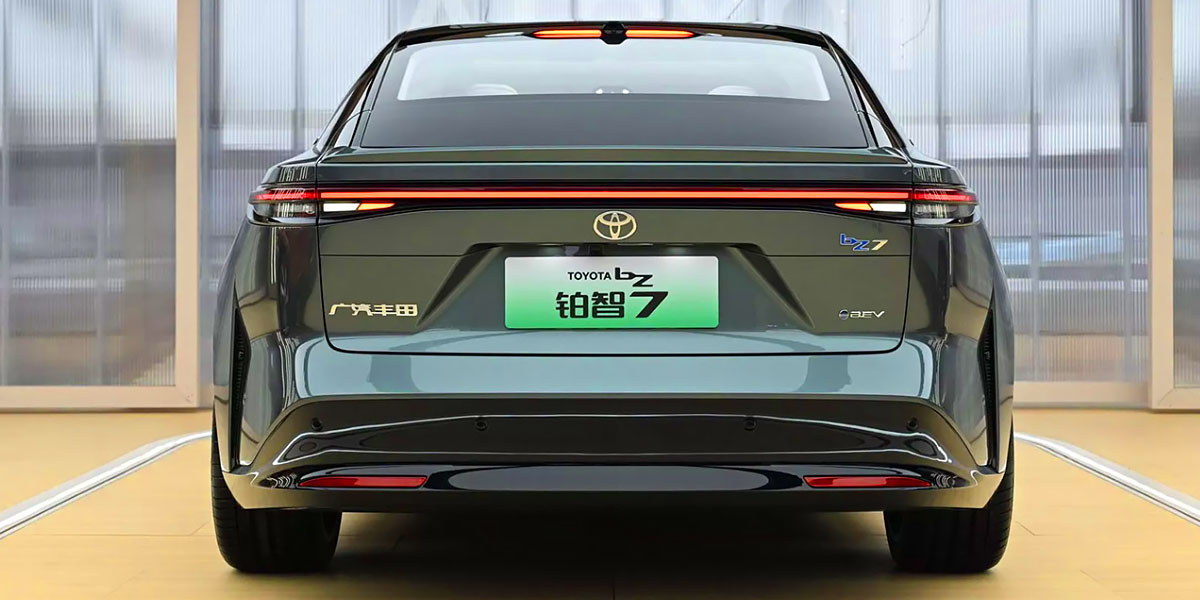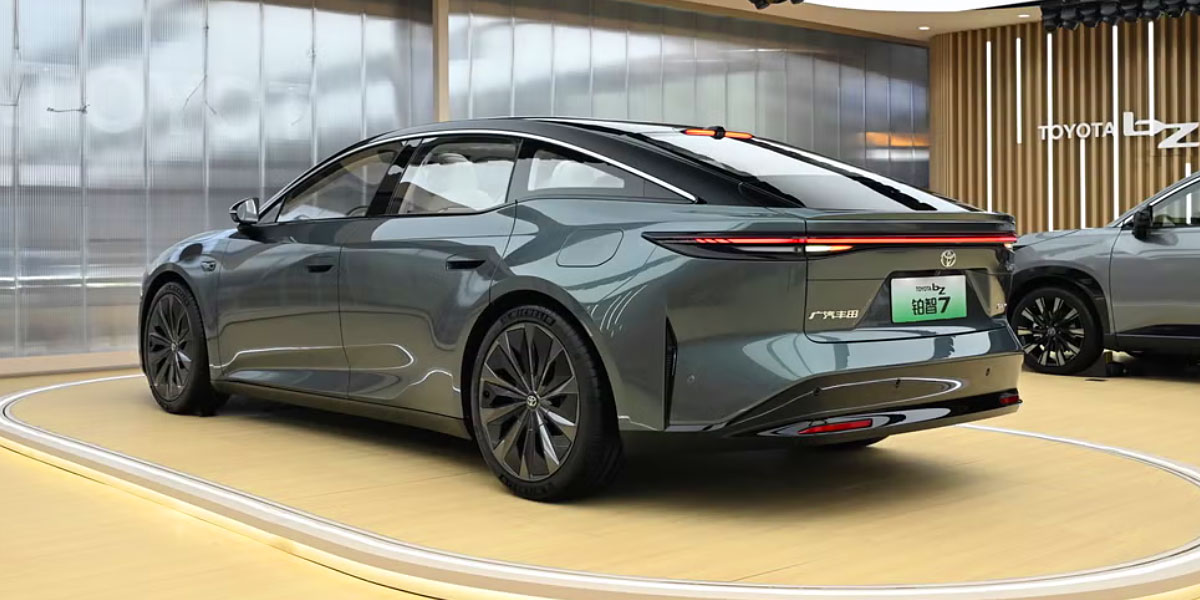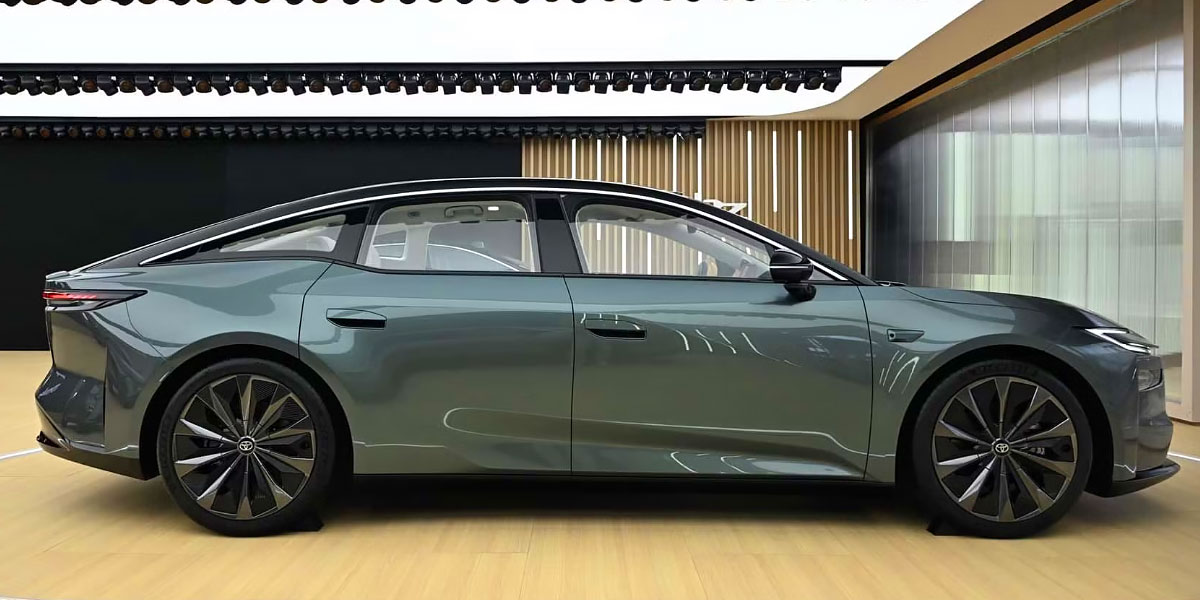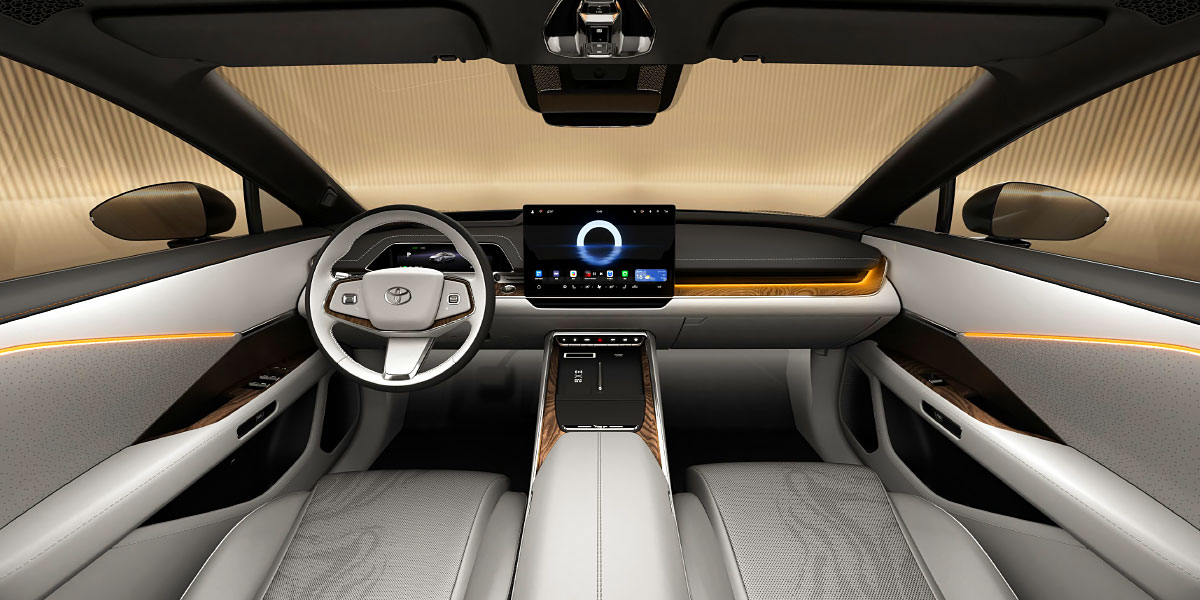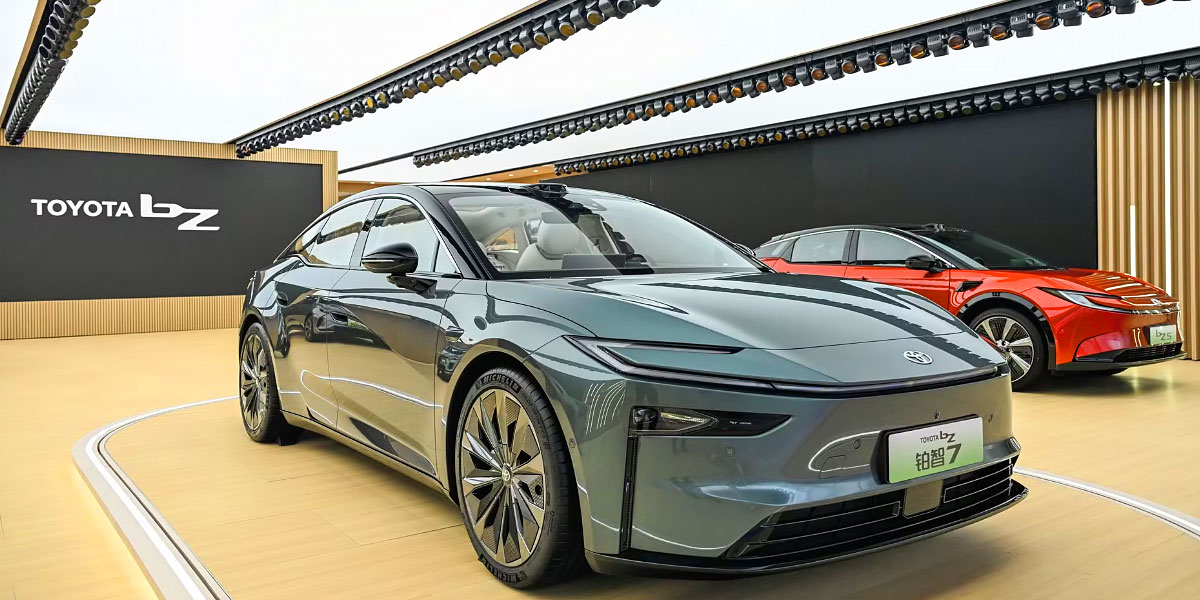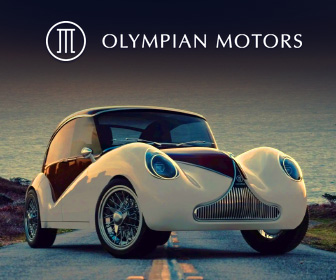Toyota bZ7
The Toyota bZ7 is a 2025 all-electric AWD flagship sedan co-developed with GAC for China. It features a 65 kWh battery, 245 hp motor, 426 mi (685 km) range, and starts at $36,000 (€33,200), merging luxury design and EV tech.
User Rating: 4 / 5 (52 votes)





Base Trim Price: $36000 USD *
| Body Type | sedan |
| Model Year | 2025 |
| Manufactured in | Japan |
| Battery Capacity (kWh) | 65 |
| Electric range (km) | 685 |
| Max. Speed (km/h) | 180 |
| Acceleration 0-100 km/h (sec) | 7.5 |
| Power (h.p.) | 245 |
| Drive Type | AWD |
* Minimum price set for the base trim by the manufacturer
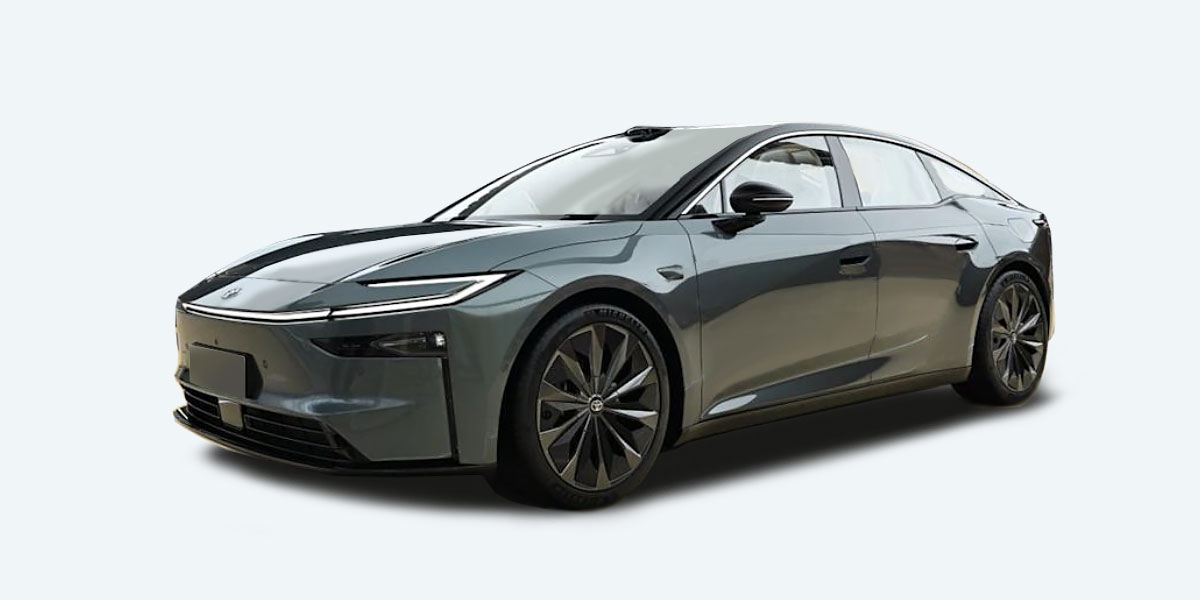
Toyota bZ7 Review
Toyota bZ7: The 2025 Flagship EV Sedan for the Chinese Market
Meet the Toyota bZ7—Toyota’s boldest electric sedan to date. Developed jointly with GAC and crafted for the Chinese market, the bZ7 steps up with sleek styling, a comfy premium cabin, and numbers that stack up nicely in the EV game.
- Manufactured in Japan and targeted at China, the Toyota bZ7 rides in on the bZ series' back, partnering with GAC to fine-tune it for local preferences.
- The bZ7 was unveiled as a flagship electric offering and enters production in 2025.
- Starting at a projected $36,000 (€33,200), it undercuts rivals like the Tesla Model 3 while stretching past Camry territory.
Toyota bZ7 Specs: Range, Battery, Performance and More
Battery
The bZ7 packs a 65 kWh lithium-ion battery that’s good for a claimed 685 kilometers (426 miles) of range. That’s a lot of road before needing a plug. While Toyota hasn’t disclosed full charging details yet, it’s safe to expect DC fast-charging support like the rest of the bZ family.
- Battery Capacity: 65 kWh
- Range: 685 km (426 miles)
- Charging Time: TBD, estimated under 1 hour with DC
Performance
This mid-size sedan brings the heat with 245 horsepower (183 kW), all-wheel drive, and a 0–100 km/h (0–62 mph) time of 7.5 seconds. The 180 km/h (112 mph) top speed should be more than enough for your daily needs—and then some.
- Power Output: 245 hp (183 kW)
- Drive Type: AWD
- Acceleration: 0–100 km/h (0–62 mph) in 7.5 seconds
- Top Speed: 180 km/h (112 mph)
As for trims? Still under wraps. But if Toyota follows their typical roadmap, we’ll see a base model and maybe a long-range or dual-motor performance variant down the road.
Exterior and Interior Features of the Toyota bZ7
Exterior
The bZ7 wears its lines with poise. A front light bar stretches across a closed-off grille, while split LED headlamps and a roof-mounted lidar give it a modern edge. At 200 inches (5.08 meters), it’s got a longer body than the Camry—more presence, more practicality.
Interior
Inside, it leans upscale with perforated white leather seating, ambient lighting, and real wood trim that’s refreshingly unpretentious. A wide display—possibly Huawei HarmonyOS-powered—sits center stage, while ADAS features keep things smart and safe.
Pros and Cons of the Toyota bZ7
Pros
- Long driving range of 426 miles (685 km)
- High-output 245 hp AWD drivetrain
- Premium cabin with luxury materials and tech
- Lidar sensor and sleek exterior touches
- Competitive price tag in EV sedan class
Cons
- China-only release (for now)
- Charging speed still unconfirmed
- No official trim breakdown yet
- Unfamiliar GAC partnership outside Asia
Conclusion: Toyota bZ7 2025 Outlook
Rolling out in 2025, the Toyota bZ7 2025 slots above the Camry and aims at upscale EV buyers in China. At $36,000 (€33,200), the Toyota bZ7 interior and performance features make it a strong contender. The Toyota bZ7 exterior design and 426-mile range back up its flagship claim, even if U.S. buyers are left watching from the sidelines.
Exterior and Interior photos of Toyota bZ7
Watch the Video Overview
F.A.Q. about Toyota bZ7
What is the range on a single charge?
The Toyota bZ7 offers a maximum range of 685 km (426 miles) from its 65 kWh battery.
How long does it take to fully charge?
Charging specs are pending, but estimates suggest under 1 hour using DC fast charging.
What is the price of a Toyota bZ7?
The starting price is $36,000 (€33,200), with higher trims expected to cost more upon release.
What is battery capacity?
The bZ7 features a 65 kWh lithium-ion battery optimized for long-range efficiency.
What is top speed?
The maximum speed is 180 km/h (112 mph), suitable for both city and highway use.
What is total power?
Total power output is 245 hp (183 kW), delivered via an AWD configuration.
Can EVs like the bZ7 be charged at any public station?
Yes, as long as the station supports CCS or GB/T standards common to bZ-series EVs.
Are EVs more efficient than gasoline cars?
Yes, EVs like the bZ7 convert over 85% of energy to motion versus ~25% in gas engines.
Are electric vehicles suitable for winter driving?
Yes, AWD and modern battery management make them reliable in cold climates.
Do electric vehicles like the bZ7 require less maintenance?
Absolutely—no oil changes, fewer moving parts, and regenerative braking reduce wear.
Comparison:
bZ7 vs EV Sedans in 2025
With the Toyota bZ7 entering China’s premium EV sedan ring, it’s only fair to size it up against others like the BYD Han EV, Xiaomi SU7, XPeng P7, and NIO ET5. These contenders all aim at similar price brackets and specs, offering a tight race in range, tech, and performance.
Range Comparison
The Toyota bZ7 offers a robust 685 km (426 mi) range. That nudges past the BYD Han EV at 610 km (379 mi) and ties with the Xiaomi SU7’s long-range model. The XPeng P7 maxes out around 665 km (413 mi), while the NIO ET5 stretches it to 700 km (435 mi) with the largest battery pack.
Acceleration
While the bZ7 clocks 0–100 km/h (0–62 mph) in 7.5 seconds, it lags behind the Xiaomi SU7 (4.8 sec) and XPeng P7 (4.5 sec). The NIO ET5 sprints in just 4.3 seconds, and the BYD Han EV sits at about 3.9 seconds in AWD trim.
Power Output
The Toyota bZ7’s 245 hp (183 kW) looks modest next to the SU7 with up to 673 hp (500 kW), the ET5 at 482 hp (360 kW), and the XPeng P7 at 430 hp (320 kW). The BYD Han EV tops out around 500 hp (373 kW).
Charging Time
Exact charge times for the bZ7 are unknown, though similar Toyota EVs hit 80% in 30–40 minutes. Meanwhile, Xiaomi SU7 promises sub-30-minute fast-charging, and NIO ET5 offers battery swaps under 5 minutes. XPeng P7 supports 30-minute charges to 80%.
Price Comparison
The bZ7’s starting price is around $36,000 (€33,200), on par with the XPeng P7 ($34,000 / €31,300) and Xiaomi SU7 ($30,000 / €27,600). BYD Han EV and NIO ET5 sit slightly higher around $42,000 (€38,700), depending on trim and battery.

